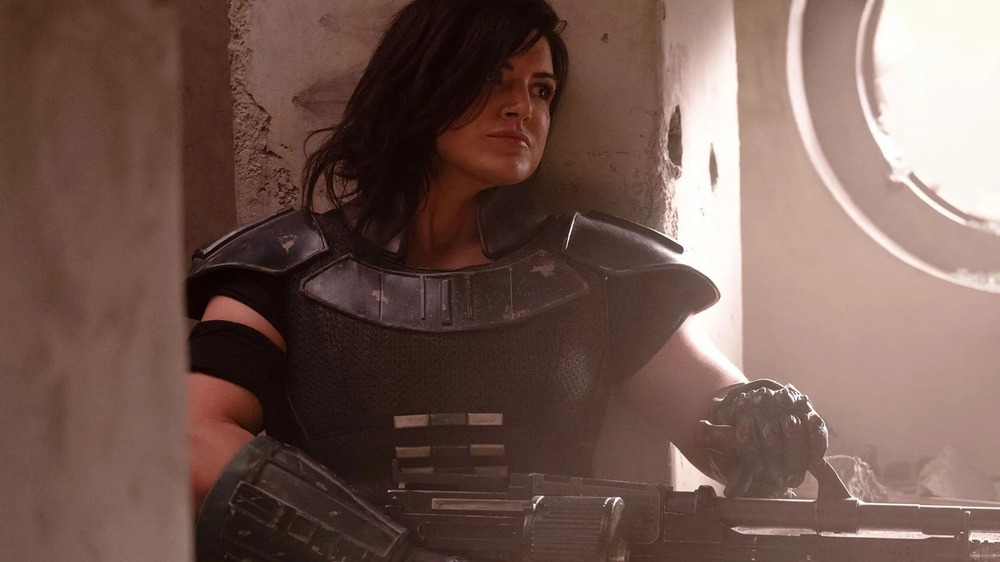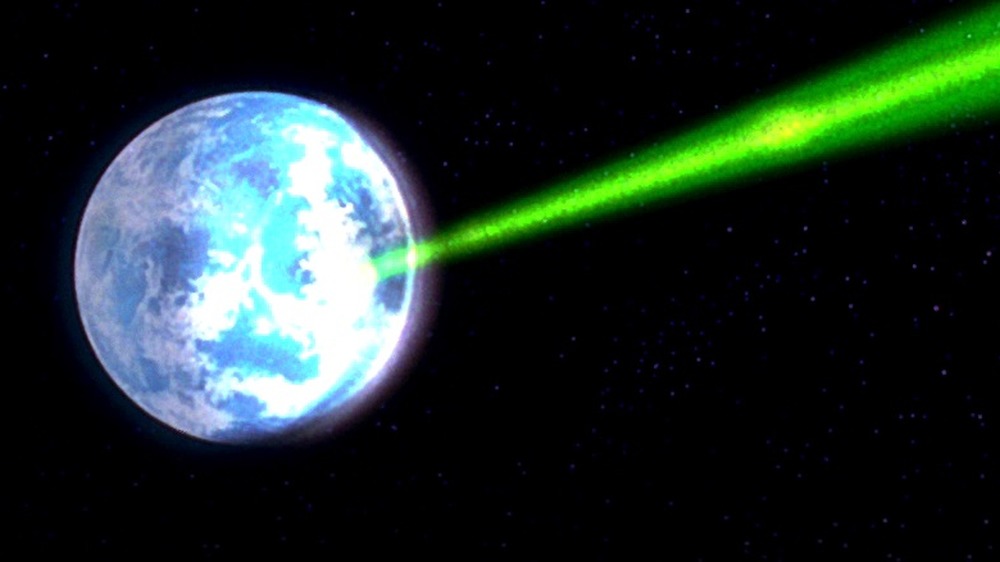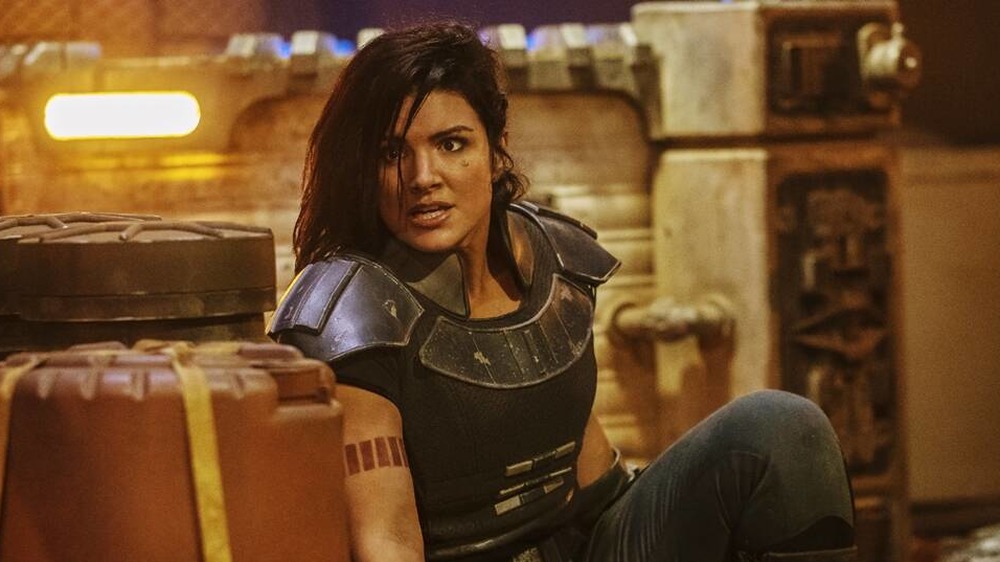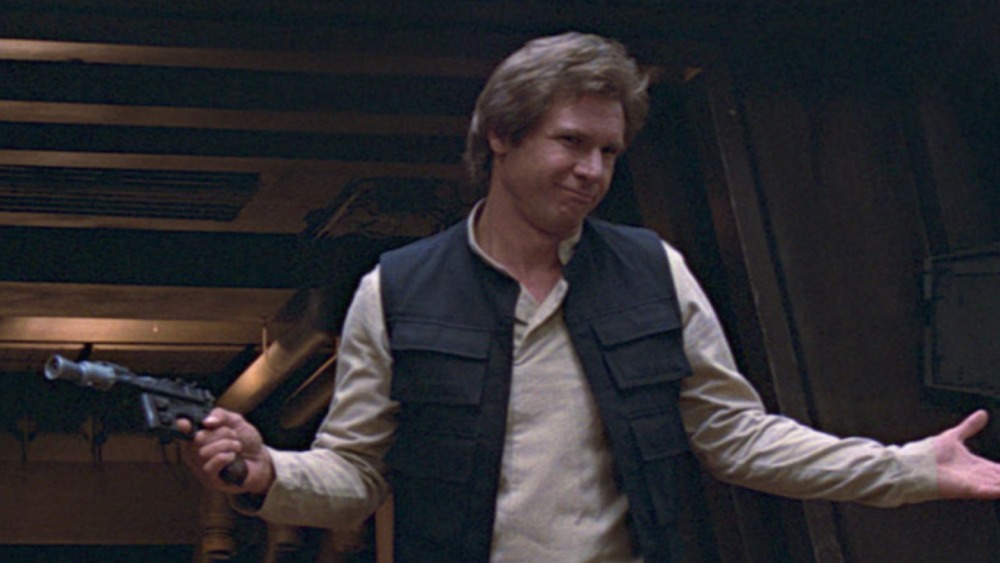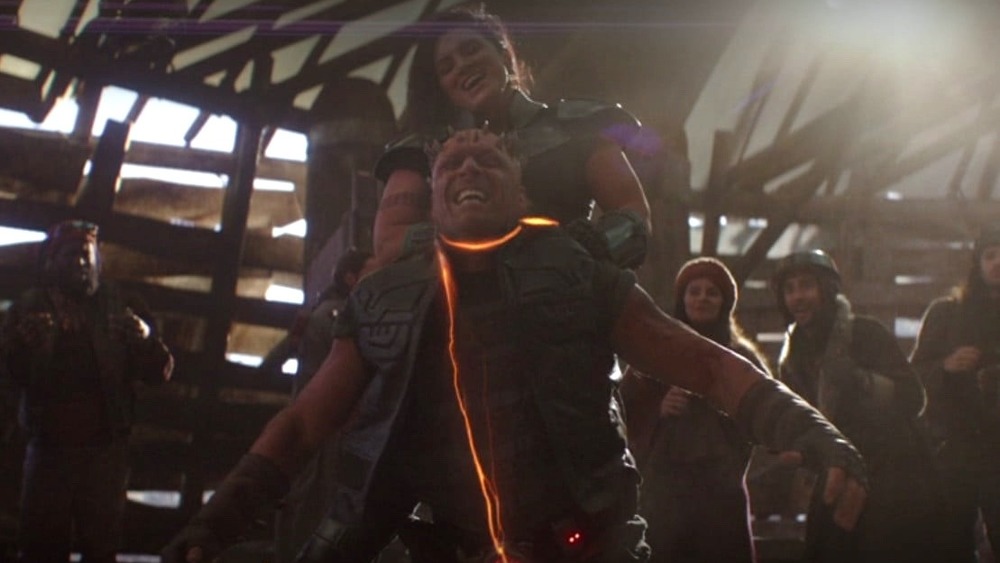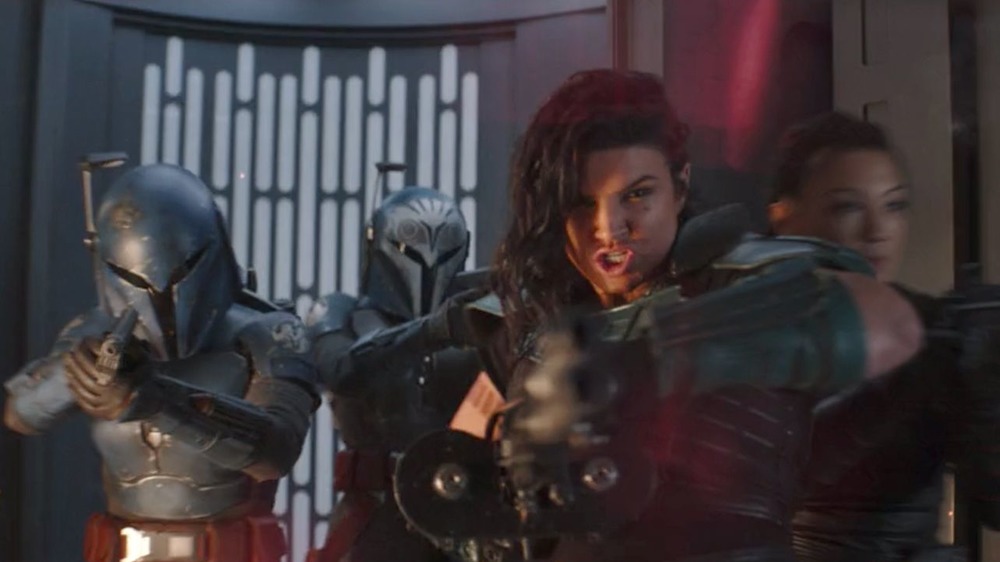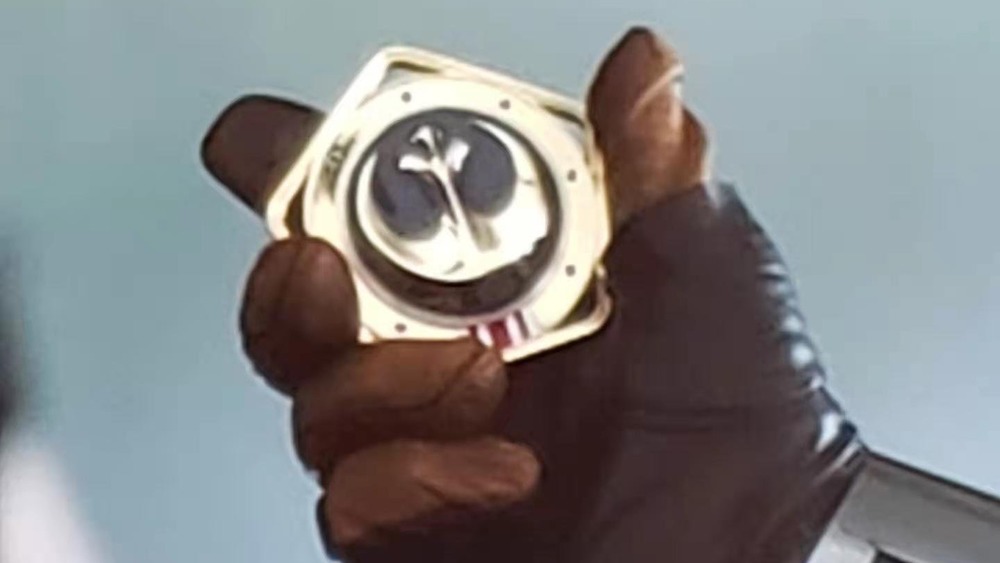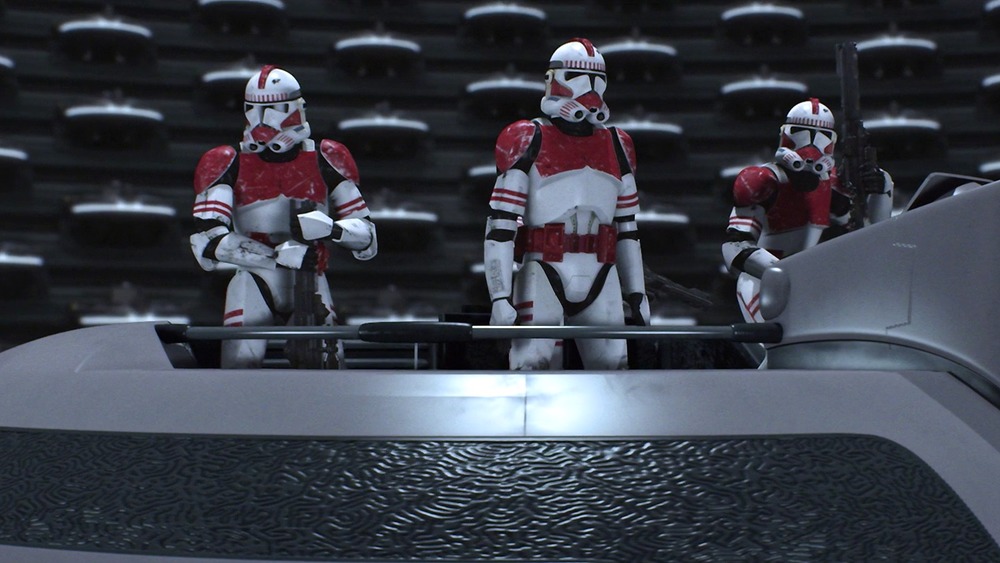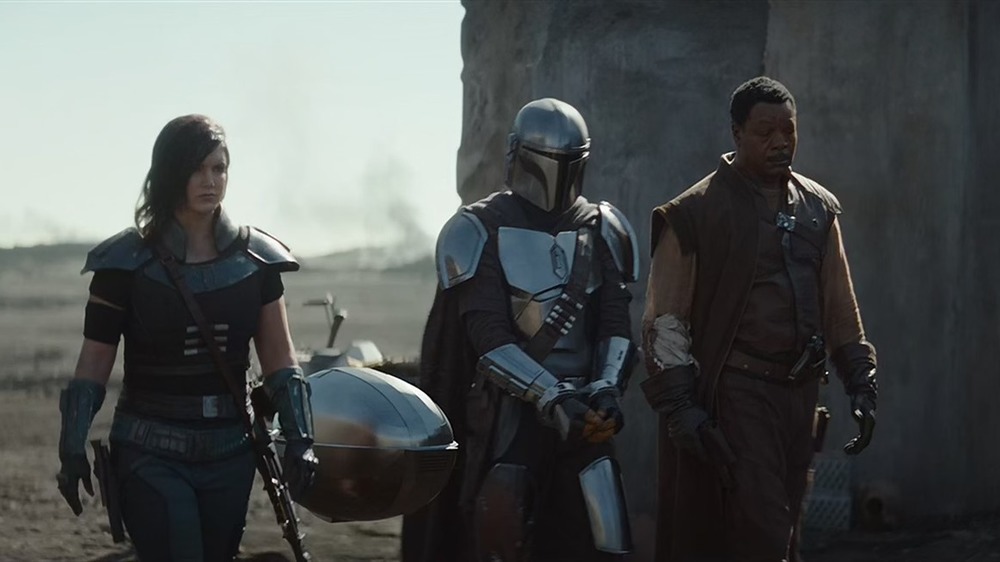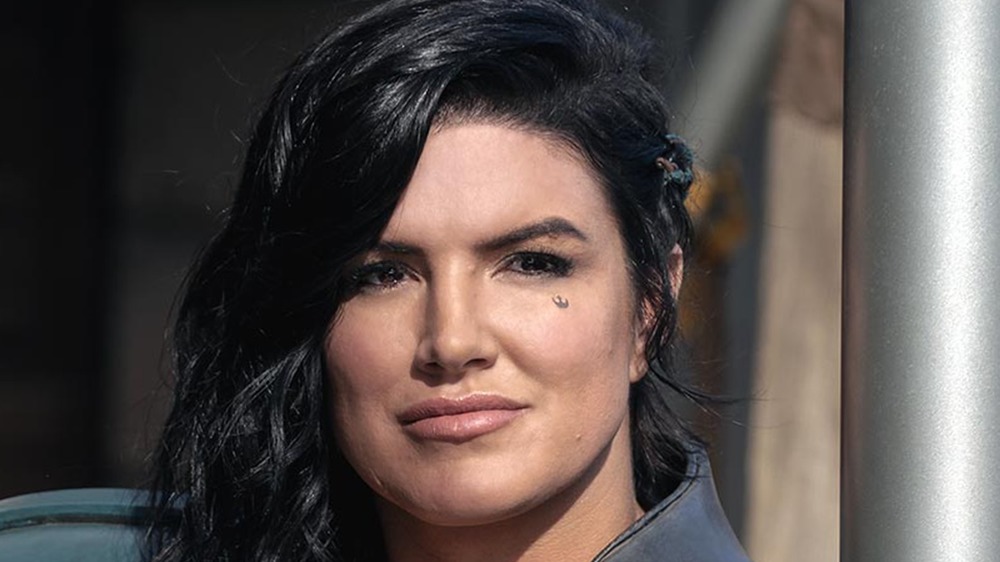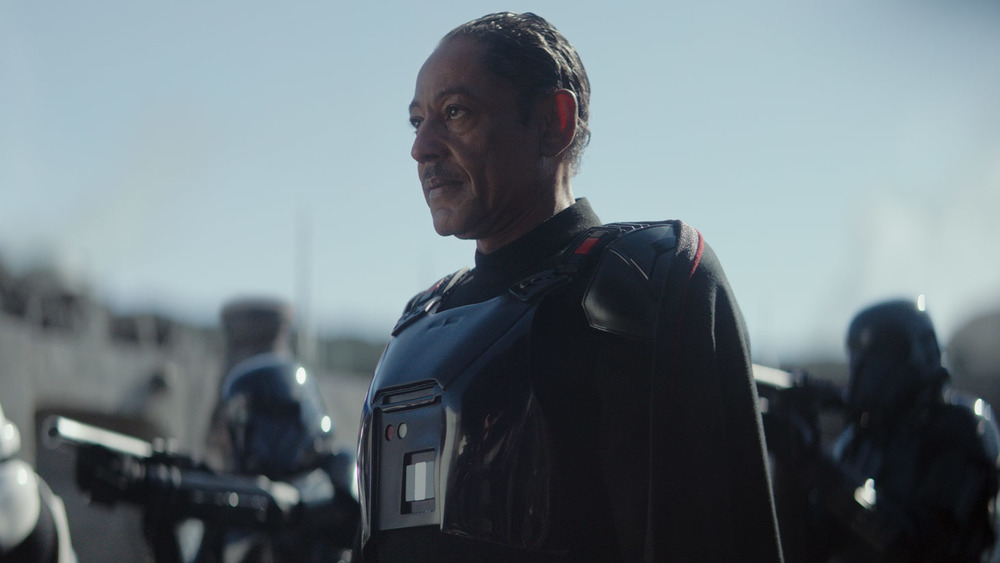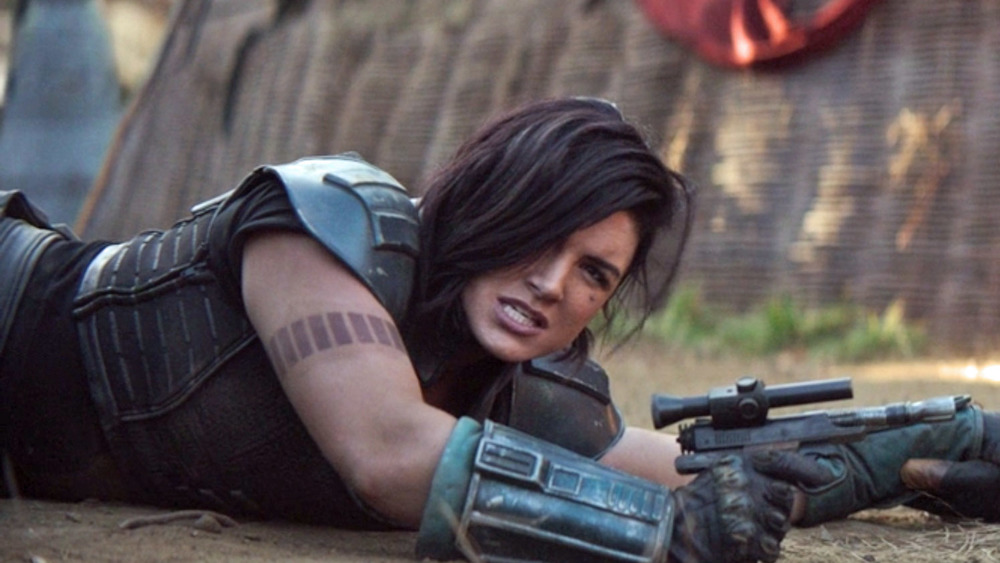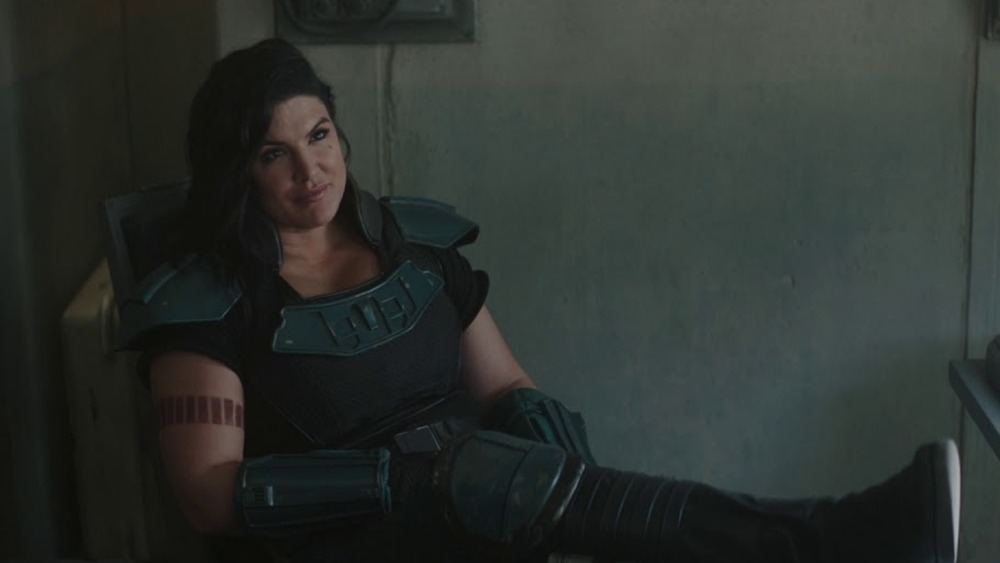Star Wars: The Untold Truth Of Cara Dune
Of all the savage heroes and power-hungry villains in The Mandalorian, Cara Dune may just be the most complex. Mandalorian Din Djarin adheres to a strict code he's only begun to question due to the adventures he's been on with his Force-sensitive "child" Grogu. Moff Gideon hungers for power at any cost. Cara, meanwhile, has a storied past she's trying to play down instead of using it as a calling card. She says she's "not a joiner" but she's been a member of the Rebel Alliance, the Republic, and Din Djarin's special missions squad.
While we hadn't heard of Cara before The Mandalorian, she's played a vital role in every chapter of the Star Wars universe since the Battle of Yavin (if not before). More an avenging soldier than a moral liberator, she wears heavy armor, both physical and emotional. But beneath her hard exterior she's fueled by compassion tinged with pragmatism and a dark core she probably hasn't come to terms with.
Survivor of a dead planet
Moff Gideon tells us who Cara Dune is at the end of The Mandalorian's first season. During their showdown in Nevarro, he taunts Din, Cara, and Greef Targa with an E-Web heavy repeating blaster and his knowledge of their identities. To show his intelligence superiority, Gideon calls her out as "Republican shock trooper Carasynthia Dune of Alderaan."
Being from Alderaan puts Cara in a tragic minority: She came from the only planet destroyed by the Galactic Empire. General Leia Organa would become the most famous survivor — and it's possible she met Cara, since shock troopers not only undertook heavy missions but eventually became escorts for dignitaries.
Given Cara's vagueness about her participation in the rebellion, it's likely she joined up after the Empire bombed her home planet. When New Republic Captain Carson Teva asks if she lost anyone in the destruction, she responds "I lost everyone." Given her battle skills and her age a mere nine years ABY (After Battle of Yavin), we have to wonder where a natural-born soldier from a pacifist planet with no military of its own would have received training.
Perhaps like so many others in the Rebel Alliance, she was trained by the Empire, which would have made the strike against Alderaan hurt even more.
An elite Special Forces Rebel, clinging to Old Republic Clone heritage
Cara Dune mentions her role as a shock trooper multiple times before Moff Gideon brings it up. She talks of being sent "in on dropships. No support, just us." This is similar to real-world special forces teams. While many militaries have airborne troops dropped behind enemy lines, these units are usually dropped in conjunction with larger military movements. Only elite special forces soldiers get dropped in with small squads and little hope of rescue unless they manage to emerge on the other side.
As Moff Gideon says, Dune "will advise you that she has witnessed many of her ranks vaporized mid-descent," so obviously she fought in many heated battles. Her survivor's guilt probably grew after Alderaan, considering all the comrades she lost in many risky, high-casualty missions.
Several times people point to her arm tattoo as proof she was an Alliance/New Republic shock trooper. Gina Carano, who plays Cara, said in an interview with the Hollywood Reporter that the tattoo came from "one of the producer's sons who watches The Clone Wars." In Clone Wars, the shock trooper clones were not only elite soldiers sent in to risky high-profile situations, they doubled as Coruscant Guards. Their helmets were decorated with vertical lines, similar to her arm tattoo.
Cara and her comrades would have therefore received similar training to the original shock troopers, specializing in urban warfare and high-profile missions. In other words, she's uniquely well-suited for the skirmishes she and Din have encountered so far.
Another scoundrel, just a more lethal one
The similarities between Cara Dune and the original galactic scoundrel Han Solo are striking. We first find her in the corner of a bar hiding from a bounty. Her sarcastic quips add gallows humor to the ever-serious Mandalorian. She claims to be a loner right before she joins up with — and after she had been a part of — the Republic. She seems to not want friendship, yet from the moment she fought along Din Djarin, she's helped him out every time he's asked. Her blaster looks a lot like Han's. She has a shady employment history. And there's her willingness to bend the rules (e.g., when she lets Migs Mayfeld out of jail to help Din). Even their names are three syllables: Han Solo; Cara Dune. You have to wonder if she shares Han's Imperial past.
In the real world, though, Han would be the lovable rogue swindling people with a game of three-card monty and maybe some pickpocketing. Cara would be a mafia enforcer.
Put simply, there's one big difference between Cara Dune and Han Solo: she definitely would've shot first.
Tough as a Wookiee
It's interesting to none the many traits Cara Dune shares with the Leia-Han-Chewie crew. Strong woman from Alderaan; sarcastic scoundrel in hiding; toughest fighter in the room. Cara doesn't hesitate for a second before fighting Din, and even with his armor and Mandalorian training, their first meeting ends in something of a draw. In the same episode, she joins Din to teach villagers fighting skills and helps take down a large group of raiders who have a repurposed AT-ST. The next time we see her, she's beating a huge man in a bare-knuckle fight by strangling him with a cord of energy. She doesn't hesitate, and she certainly isn't trying to negotiate.
In an interview with Vanity Fair, Carano talked about how she first thought she was going to be playing a female Wookiee after seeing the part. It should be added that when Jon Favreau first wrote the part of Cara Dune, he had the former MMA fighter in mind.
Cara's go-for-the-jugular intensity was obviously honed over her military career. But in The Mandalorian, she thrives in the chaos of battle, much more than a standard grunt. It's obvious that even when she was a part of the Rebellion and the Republic, she would often have been the most aggressive in the group, which would have been an asset sometimes and a problem at others. Soldiers can't do their own thing.
A path littered with bodies
Cara Dune is more than just a tough grunt. There's a difference between killing faceless enemies in war and assassinating individual targets. As we saw with her beast mode charge in the Mandalorian season 2 finale, Cara Dune has killed a lot of enemies at close range with a combo of physical attacks and arms fire.
But in season 1, Cara sniped a shot through the thin front window of an AT-ST. That's a tough shot to make — none of the well-trained members of the strike team in the Battle of Endor that we saw were able to pull it off. Combined with her statement that "if anybody runs my chain code, I'll rot in a cell for the rest of my life," it points to the likelihood that as a merc, her jobs included assassinations. The chain code is an identifier within the New Republic, so she's committed top crimes in their penal code, likely including murders. Given her experience providing security for high-level officials, she'd be even better suited to high-level assassinations.
As evidenced by Cara's proficiency with that massive repeating rifle she carries, she's killed a lot of people in batches. But she also carried out quite a few individual executions. And some were no doubt questionable targets whose deaths would've been investigated by the New Republic.
Still, she's a good guy who's done bad things
Sure, "good" and "bad" are relative terms, but it's pretty clear that the Empire and the top criminals in the galaxy (e.g. the Hutts) are bad guys. Cara Dune has killed a lot of people — and at least most of them were villains.
She admits from the start that she's committed crimes, and they weren't petty theft. A mercenary with her record would be in high demand for taking out heavies. But if she had moved directly against somebody associated with the Alliance or the Republic, Captain Teva wouldn't have invited her to rejoin the Republic. And she certainly could never have passed whatever vetting would have taken place for her to become a Republican Marshal if she'd assassinated a top Republican official.
So whatever she's done, the heaviest stuff was against the bad guys. Unlike other mercenaries, even Din, who prior to meeting Grogu hadn't made judgments as to who he serves, Cara is motivated by her quest for revenge against the Empire. When Din asks her to help him eliminate the top threat to Grogu, she says no. Then Din reveals "he's not a local warlord, he's Imperial." To that, Cara Dune replies with two words: "I'm in."
Loves the fight, hates the peace
Throughout The Mandalorian, Cara has been the most reliable partner Din Djarin could ask for when it comes time to throw down. And given her role as Rebel and then New Republic shock trooper, she signed up likely when Alderaan was destroyed or shortly after the Battle of Yavin (ABY) and stayed in after the battle of Endor, "mopping up" warlords. While many soldiers segued into civilian lives, she looked for the next mission. Her missions post-Endor were risky strikes at warlords, remnants of the Imperial establishment with large forces still loyal to them and little to lose.
But the jobs she didn't like? The boring ones. Escorting New Republic dignitaries. Bodyguard duty. Riot suppression. The original Clone Wars shock troopers, who inspired her arm tattoo, were also Coruscant guards, peacekeepers for the galactic capitol and its dignitaries. But Dune's hunger for the fight was obviously greater than her sense of duty — or maybe she'd seen how the Coruscant Guards became the secret police for Emperor Palpatine himself and didn't want to follow in those footsteps.
The irony is that in the twilight of the Old Republic, those duties were also held by Jedi, the original peacekeepers of the galaxy. Anakin Skywalker and Ahsoka Tano shared Dune's dislike of such jobs as well, so she's in good company. At least where Ahsoka's concerned.
Still, acting as part of a security detail for Grogu seems to have rekindled her sense of duty to a peacetime New Republic.
Much more of a joiner than she wants to admit
Just like Han Solo, Cara Dune likes to present herself as a self-interested loner. And like Han, she's anything but. Din Djarin and the other Mandalorians never became part of the New Republic nor the rebellion despite the fact that the Empire turned Mandalore "to glass." She enlisted in the Rebel Alliance to avenge her home planet.
Sure, she left the establishment when the role of peacekeeper got boring, but by the end of The Mandalorian season 2, she's back with the New Republic as a Republican marshal. Earlier, when she meets Din, she joins him to protect a small village "for lunch money" and sees it through out of a sense of loyalty. She even suggests Din leave a life of battle behind and settle down with the local widow who seems to have caught his eye.
All of this shows a woman who wants to be a loner but cares about other people much more than she wants to, due in large part to a desire to avoid losing anybody or anything else she cares about. Maybe she worries about what joining back up will mean for her drive to avenge her home planet. Or it may just be that rejoining the Republic might infringe on her freedom to make her own choices as to right and wrong, such as when she frees a Republican prisoner to help out a friend.
Her face tattoo is more than just a decoration
From day 1 it was obvious that Cara Dune was a member of the rebellion thanks to the small face tattoo of the Rebel Alliance Starbird. It was obvious there was more meaning behind it, and Gina Carano said as much in her interview with the Hollywood Reporter: "The eye tattoo has a much deeper meaning once we get into it." In the last episode of The Mandalorian season 2, it's revealed that her Starbird tear is a tattoo shared by survivors of Alderaan, one worn by enough people that an Imperial pilot recognizes it.
Since the tattoo is identifiable, there must be more Alderaanians, especially in combat positions where they can get a face tattoo like this. The only other Alderaanians we've met in Star Wars canon are dignitaries Bail Organa, his lesser-known wife Breha (both pre-explosion), and their adopted daughter Leia. Captain Raymus Antilles makes a brief appearance on the Tantive IV, the ship that ended Rogue One and opened up A New Hope, but that's about it.
No doubt the loss of Alderaan fuels Cara's hunger for vengeance against the Empire. Whether she has met a community of fellow survivors is unknown but likely. And such a force of vengeful Alderaanians, if its members have even half the heart and intensity of Cara Dune, will be frightening to any leftover Imps.
Moff Gideon and Imperial intelligence
Cara Dune's most recent gig for the Republic was hunting down warlords, remaining Imperial officers with large forces of the fractured Imperial army loyal to them. Moff Gideon is one of these warlords, but he was believed to have been executed, which means he was skilled enough at hiding that he could convince Republican intelligence they killed him. Usually, troopers tasked with wiping out enemy warlords know the faces of their prime targets. (For example, in the Iraq War the U.S. military issued a deck of cards featuring top Iraqi targets for all soldiers to memorize.) Yet she didn't recognize Gideon's.
This shows that the intelligence of the fractured remnants of the Empire is still strong. Or perhaps the Republic isn't telling its top troops everything. Either way, all of Cara's physical prowess and strategy can't compare with the wealth of clandestine knowledge Gideon has at his fingertips. At the end of season 2 she knocks him unconscious and takes him back to the New Republic for questioning. How his interrogation goes — and what information gets passed on to her — could have a major impact on the Star Wars shows and films we see going forward.
A dark secret
Cara Dune had a pivotal role as an elite shock trooper during the rebellion — and afterwards, when she and her small teams were tapped to continue destroying the remnants of the Empire. Then she became one of several "peacekeepers, escorting delegates, suppressing riots," a role that used to be occupied not only by Coruscant Guards but also by Jedi Knights themselves. Put together, she should be a vaunted member of the Republic. But Dune says only that she didn't sign up for these peacetime duties and took an early retirement.
The term "early retirement" is vague, so maybe Dune's initial concerns about rejoining the Republic come from some sort of AWOL status. But given her record and the high-level connections she would've made over the time of her service, that should be no big deal.
Sometimes a soldier will want to get away from the violence and heal in a peaceful corner. But it's obvious Cara Dune has no such desire. So why is she hiding out when we first meet her, and why was she so reluctant to rejoin the Republic?
Since she's not trying to stay out of battle, nor has she committed any egregious offenses against the Republic, the only logical reason for her reluctance has to be something dramatic in her past. A dark secret. Either a sin or a tragedy still haunts her, something even more personal than Alderaan.
A rising star?
Cara Dune has gone from mercenary in hiding to Republican marshal. Obviously, meeting Din Djarin and seeing his commitment to Grogu has inspired her to get back to fighting for something more than a payday. But while Mando has led her to a path of redemption, her own skills, formal record, and accomplishments are enough to propel her up in the new galactic order.
The Disney+ Star Wars series Rangers of the New Republic is rumored to include — and possibly even focus on — Cara Dune. This, alongside a show focused on Ahsoka Tano, will likely include storylines that interweave with The Mandalorian. According to Lucasfilm head Kathleen Kennedy, "These interconnected shows, along with future stories ... will culminate in a climactic story event."
Cara Dune is the fighter you want next to you when up against heavy odds. She's fearless and savage, with experience that backs up her physical prowess. But the questions about her background and the cynical darkness that lurks behind her eyes may turn her into a galactic wild card as we see the dark side reform the fractured Empire into the First Order.
